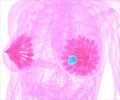Researchers identified increased levels of annexin-A6 also in the exosomes of breast cancer patients undergoing neoadjuvant chemotherapy.

‘Some patients with breast cancer receive chemotherapy before the tumor is removed with surgery. This approach, called 'neoadjuvant' therapy, helps to reduce the size of the tumor to facilitate breast-conserving surgery, and can even eradicate the tumor, leaving few or no cancerous cells for the surgeon to remove. ’





Under chemotherapy, the exosomes contain the protein annexin-A6, which is not present in the exosomes released from untreated tumors. "It seems that loading of annexin-A6 into exosomes is significantly enhanced in response to chemotherapy," explains Ioanna Keklikoglou, first author of the study. After being released from a chemotherapy-treated tumor, the exosomes circulate in the blood. Upon reaching the lung, the exosomes release their content, including annexin-A6. This stimulates the lung cells to release another protein, CCL2, which attracts immune cells called monocytes.
This immune reaction can be dangerous, as previous studies have shown that monocytes can facilitate the survival and growth of cancerous cells in the lung, which is one of the initial steps in metastasis. "In short, our study has identified a new link between chemotherapy and breast cancer metastasis," says De Palma.
Corroborating their laboratory data, the researchers found increased levels of annexin-A6 also in the exosomes of breast cancer patients undergoing neoadjuvant chemotherapy. However, De Palma cautions against jumping to conclusions: "While this observation supports the significance of our findings, at the moment we don't know if annexin-A6 has any pro-metastatic activity in human breast cancer".
Importantly, the researchers found that neutralizing annexin-A6 or blocking monocytes during chemotherapy prevents the experimental mammary tumors from metastasizing to the lung. These results may help to improve the efficacy and safety of neoadjuvant chemotherapy. "Various monocyte inhibitors have been developed for clinical use, so they may be tested in combination with neoadjuvant chemotherapy to potentially limit unwanted side effects mediated by exosomes," says De Palma.
Advertisement
Professor De Palma' lab is part of the Swiss Institute for Experimental Cancer Research (ISREC) within the School of Life Sciences at EPFL. ISREC is deeply involved in the Swiss Cancer Center Léman (SCCL), a cancer research consortium that includes the University hospital of Lausanne (CHUV), the Geneva University Hospitals (HUG), the universities of Lausanne (UNIL) and Geneva (UNIGE), and EPFL.
Advertisement










